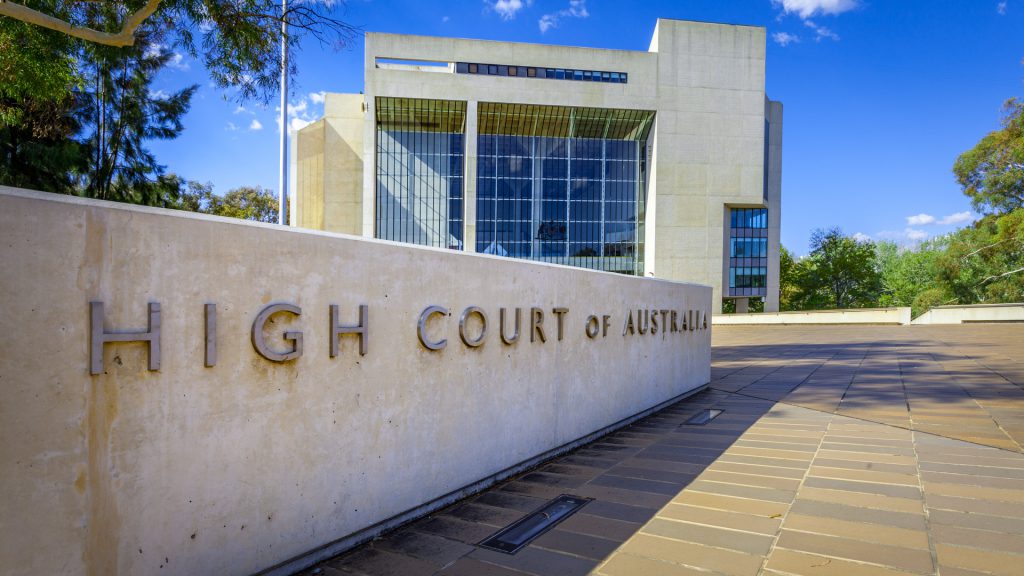
Published April 6, 2020
The unanimous decision by Australia’s High Court to quash a guilty verdict and enter a verdict of “acquitted” in the case of Pell vs. The Queen reverses both the incomprehensible trial conviction of Cardinal George Pell on a charge of “historic sexual abuse” and the equally baffling decision to uphold that false verdict by two of the three members of an appellate court in the State of Victoria last August. The High Court’s decision frees an innocent man from the unjust imprisonment to which he has been subjected, restores him to his family and friends, and enables him to resume his important work in and for the Catholic Church. The decision also begins the process of rebuilding international confidence in Australia’s criminal justice system, which has been badly damaged by the Pell case—although there is much more remedial work to be done on that front, especially in the State of Victoria, Ground Zero of the Pell witch hunt that raged for years and that culminated in this tawdry affair.
Close students of Pell vs. The Queen have known for some time that this case ought never have been brought to trial. The police investigation leading to allegations against the cardinal was conducted in a dubious, indeed sleazy, fashion. The magistrate at the committal hearing (the equivalent of a grand jury proceeding ) was under intense pressure to bring to trial a set of charges she knew were very weak. When the case was tried, the Crown prosecutors produced no evidence that the alleged crimes had ever been committed, basing their argument solely on the testimony of the complainant—testimony that was inconsistent over time and that has subsequently been shown to have been deeply flawed. There was no corroborating physical evidence and there were no witnesses to corroborate the charges. To the contrary: those directly involved in Melbourne’s cathedral at the time of the alleged offenses (some twenty years ago) insisted under oath and during cross-examination that it was impossible for events to have unfolded as the complainant alleged—neither the time-frame used by the prosecution to describe the alleged abuse nor the complainant’s description of the layout of the cathedral sacristy (where the crimes were said to have been committed) made any sense. This extensive testimony in the cardinal’s defense was never seriously dented by the prosecution. Moreover, the sheer impossibility that what was alleged to have happened actually happened was subsequently confirmed by objective observers and commentators, including those who held no previous brief for Cardinal Pell (and one who had been a severe critic).
Pell vs. The Queen was also prosecuted in a way that raised grave doubts about the commitment of the Victoria authorities to such elementary tenets of Anglosphere criminal law as the presumption of innocence and the duty of the state to prove its case “beyond a reasonable doubt.” In this regard, Justice Mark Weinberg, the dissenting judge in last summer’s appellate case, made a crucial jurisprudential point while eviscerating his colleagues’ decision to uphold Cardinal Pell’s conviction in August 2019: By making the complainant’s credibility the crux of the matter, both the prosecution and Weinberg’s colleagues on the appellate panel rendered it impossible for any defense to be mounted. Under this credibility criterion, no evidence of an actual crime was required, nor was any corroboration of the charges; what counted was that the complainant seemed sincere. But this was not serious judicial reasoning according to centuries of the common law tradition. It was an exercise in sentiment, even sentimentality, and it had no business being the decisive factor in convicting a man of a vile crime and depriving him of his reputation and his freedom.
(Had the High Court upheld a conviction on these grounds, there would have been the most serious doubt that any Catholic cleric, or indeed anyone, charged with sexual abuse by a “credible” complainant could receive a fair trial in Australia. For by this credibility criterion, any defendant is prima facie condemned as guilty.)
As Justice Weinberg’s extraordinary, 200+ page dissent was digested by jurists and veteran legal practitioners in Australia, and as the lifting of a press blackout on coverage of the Pell trial exposed the thinness of the prosecution case, a rising tide of concern among thoughtful people, convinced that a grave injustice had been done, could be felt—even at a distance of thousands of miles from Melbourne. That concern may have been reflected in the decision by the High Court, Australia’s supreme judicial body, to accept a further appeal (which need not have been granted). Similar concerns were evident in the sharp grilling of the Crown’s chief prosecutor when the High Court heard the cardinal’s appeal in March 2020. That two-day exercise made it plain, again, that the Crown had no case that would meet the standard of guilt beyond a reasonable doubt; that the jury in the cardinal’s second trial (held because of a hung jury at his first trial) returned an unsafe and indeed insupportable verdict; and that the two judges of the Victoria Supreme Court who upheld the conviction (one of whom had no criminal law experience whatsoever) made grave errors of the sort that their colleague, Justice Weinberg, identified in his dissent.
The High Court’s decision to acquit Cardinal Pell and free him is thus both just and welcome. The question of how any of this could have happened in the first place remains to be adjudicated, however. And it is imperative for the future of the Australian criminal justice system, and indeed for the future of Australian democracy, that a serious examination of conscience followed by a serious public reckoning take place.
As I have written before, the vicious public atmosphere surrounding Cardinal Pell, especially in his native State of Victoria, was analogous to the poisonous atmosphere that surrounded the Dreyfus Affair in late-nineteenth century France. In 1894, raw politics and ancient score-settling, corrupt officials, a rabid media, and gross religious prejudice combined to cashier an innocent French army officer of Jewish heritage, Captain Alfred Dreyfus, for treason, after which he was condemned to the hell of Devil’s Island. The Melbourne Assessment Prison and Her Majesty’s Prison Barwon, the two facilities in which George Pell has been incarcerated, are not Devil’s Island, to be sure. But many of the same factors that led to the false conviction of Alfred Dreyfus were at play in the putrid public atmosphere of the State of Victoria during the past four years of the Pell witchhunt. The Victoria police, already under scrutiny for incompetence and corruption, conducted a fishing expedition that sought “evidence” for crimes that no one had previously alleged to have been committed; and by some accounts, the police saw the persecution of George Pell as a useful way to deflect attention from their own (to put it gently) problems. With a few honorable exceptions, the local and national press bayed for Cardinal Pell’s blood. Someone paid for the professionally printed anti-Pell placards carried by the mob that surrounded the courthouse where the trials were conducted. And the Australian Broadcasting Corporation—a taxpayer-funded public institution—engaged in the crudest anti-Catholic propaganda and broadcast a stream of defamations of Cardinal Pell’s character (most recently in a series coinciding with the deliberations of the High Court).
To imagine that an unbiased jury could have been empaneled in these fevered circumstances is to imagine a great deal—and perhaps to imagine the impossible. Yet the present law in the State of Victoria did not allow the cardinal to request a bench trial by a judge alone. So what might have been imagined to be a sober legal proceeding came to bear the hallmarks of a slow-motion political assassination by judicial means.
And it does not strain credulity to imagine that that was, all along, the intention of some of those involved in the persecution of George Pell.
Democratic politics is a contact sport, and nowhere more so than in Australia. The frenzied public madness surrounding George Pell did not bespeak a robust democracy sustained by a vital public moral culture, however; it bespoke something more primitive and far more dangerous. Thus the High Court struck a blow for democratic decency and democratic renewal, as well as for justice, by allowing Cardinal Pell’s appeal and entering a verdict of acquittal into the record. The High Court’s decision will not change the minds of the pathological Pell-haters, whose name is legion. And it is a safe bet that further attacks on the cardinal’s character will be forthcoming. Perhaps, though, the High Court decision will embolden the Australian parliament to take another step toward democratic renewal Down Under and look into the condition of the police and the criminal justice system in the State of Victoria—and to conduct an inquiry into why the country’s government-owned public broadcasting system is permitted to engage in defamation of character on the taxpayers’ dollar.
Throughout this ordeal, Cardinal George Pell has been a model of patience, and indeed a model of priestly character. Knowing that he is innocent, he was free even when incarcerated. And he put that time to good use—“an extended retreat,” as he called it—cheering his many friends throughout the world and intensifying an already-vigorous life of prayer, study, and writing. Now that he can, at last, celebrate the Mass again, I’ve no doubt that he will make, among his intentions, the conversion of his persecutors and the renewal of justice in the country he loves.
As a citizen of Vatican City, Cardinal Pell did not have abandon his work in Rome to return to Australia for trial. The thought of appealing to his diplomatic immunity never occurred to him, though. For he was determined to defend his honor and that of the Australian Church, which he had led in addressing the crimes and sins of sexual abuse (and in many other ways) for years. George Pell placed his bet on the essential fairness of his countrymen. The High Court’s decision has vindicated that wager, finally. The reception of the court’s decision will tell a lot about whether the Australian media and the Australian people have learned anything from all of this.
George Weigel is Distinguished Senior Fellow of Washington’s Ethics and Public Policy Center, where he holds the William E. Simon Chair in Catholic Studies. He is the author of over twenty books, including Witness to Hope: The Biography of Pope John Paul II(1999), The End and the Beginning: Pope John Paul II—The Victory of Freedom, the Last Years, the Legacy (2010), and The Fragility of Order: Catholic Reflections on Turbulent Times (Ignatius Press, 2018). His most recent book is The Irony of Modern Catholic History: How the Church Rediscovered Itself and Challenged the Modern World to Reform.








